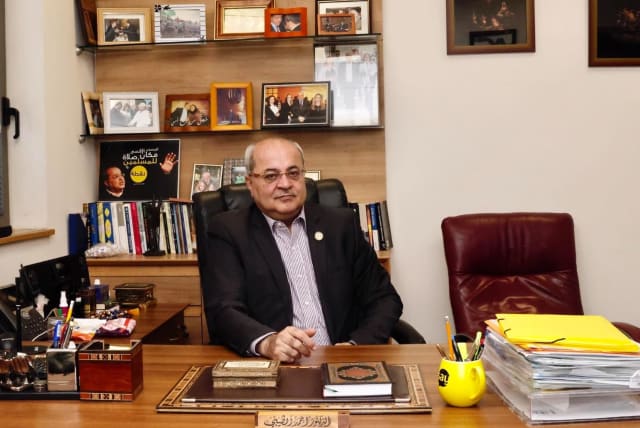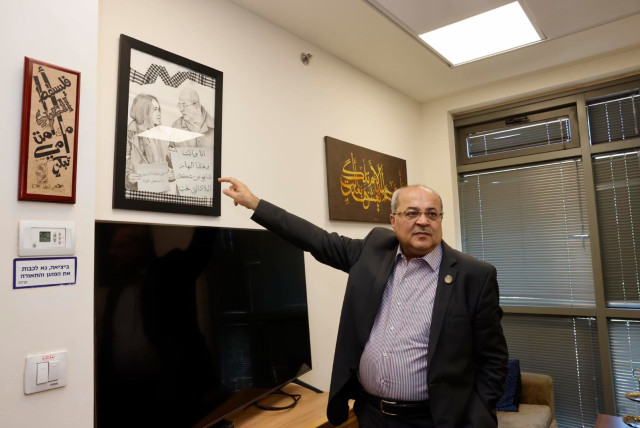Arab Israelis 'oppressed' into silence over Hamas war, Arab MK claims

Tibi’s exclusive interview depicts the situation that Arab-Israelis are in during the Israel-Hamas war.
Experiencing the war on two simultaneous fronts, Arabs in Israel are being “oppressed to be silent” about their opposition to the war in Gaza, yet are the only sector exposed to the reality on the ground, Hadash-Ta’al Knesset faction leader MK Ahmad Tibi told The Jerusalem Post in an interview on Sunday.
The interview is Tibi’s first with an Israeli news outlet since the beginning of the war. It took place in his spacious office in the Knesset – the perks of being a member of Knesset since 1999. The office is decorated with verses from the Koran and the poetry of Palestinian national poet Mahmoud Darwish.
According to Tibi, Israeli mainstream news outlets are not reporting on the human suffering in Gaza – but Israel’s Arab citizens, whom Tibi insists should be called “Palestinian citizens of Israel,” follow Al-Jazeera and other Arab-language news, and have a more direct visual as to what Gazan civilians are going through.
They have thus developed a critical stance on what Tibi calls the “atrocities” resulting from Israel’s bombardments.
“The Arab public opposed the killing of Israeli civilians on October 7, and said so, but also sees daily mass killing and war crimes in bombings of Gaza, and hears ministers talk about atomic weapons [or] Jericho missiles with nuclear warheads, calls to erase Gaza, [and] statements that there are no innocent civilians in Gaza … and these very days Palestinians are starving, especially in north Gaza and Gaza City,” Tibi says.
A divided country
An October poll by the Israeli Democracy Institute showed that 48% of Jewish Israelis said that the suffering of Palestinian civilians should not be taken into consideration when planning the next phase of fighting in the Gaza Strip. Thirty-six percent of Jewish Israelis said that it should “not so much” be taken into consideration, while most Arab Israelis (83%) believe that it should be taken into account.
A similar split was seen regarding adherence to international law. Jewish Israelis were divided at the time on whether the IDF should follow the laws; a large majority on the Left (81%) and a majority in the Center (59%) agreed it should ensure it does not violate them, with a minority of 36.5% on the Right. However, there was broad agreement among Arab Israelis, 83% of whom believe the IDF should ensure their military operations do not violate these laws.
Many Gazans have relatives and family members in sovereign Israel, Tibi says. Thirteen members of his own extended family have died in the war, including a 10-year-old cousin who shared his name, Ahmad Tibi, and a four-year-old relative named Lama.
Ahmad was killed in the bombing of an apartment building in which there was a suspected Palestinian Islamic Jihad operative – but according to residents, none was found, Tibi says. Lama, 4, was killed in the bombing of a building next door to a building where her family was seeking refuge in southern Gaza.
“Some called it collateral damage – what a terrible, inhumane phrase,” Tibi says.
Do Israelis 'simply do not care'?
In addition to the human suffering, Tibi believes that many Israelis – including those who are generally considered in the Center or Center-Left – simply do not care. He calls this a process of “brutalization” of Israeli society and says that while all of Israeli society was traumatized on October 7 and entered into a state of post-trauma, some “moved on from it,” while others are “deep in trauma and responding pathologically.
“Some Jewish politicians whispered their condolences, but for some, it did not matter – this is brutal, inhumane behavior,” Tibi says. Some people on social media expressed happiness over the death of Tibi’s family members– and a journalist even said that she hoped Tibi had “learned his lesson.”
Tibi gives another example of retired IDF general Giora Eiland, who has repeatedly called for Israel to initiate a humanitarian crisis in Gaza that would include starvation, disease, and “bodies piled up in hospitals,” until all of Israel’s hostages are returned; or popular Israeli singer Idan Raichel, who said that there were no innocent people in Gaza, meaning that Israel could attack Gazan civilians with impunity – since they did not break into the tunnels to free hostages.
“Imagine if a Russian general called to starve Ukraine and spread disease … [US President Joe] Biden would respond, [US Secretary of State Antony] Blinken would recruit the EU, the United Nations Security Council would convene, and [an] appeal [would be filed] to the International Criminal Court at the Hague. But there are double standards for those who say or do the same thing in Israel,” Tibi argues.
He also mentions claims of torture in Israeli jails – such as that of Dr. Muhamad Abu Salmiya, the director of Gaza’s Shifa Hospital, whose family claimed this week he was tortured and humiliated after he did not agree to say in a video that he knew about the tunnels underneath the hospital. According to Tibi, the Shin Bet could not be reached for comment on the issue.
What further complicates Israeli Arabs’ situation in general, and especially in wartime, is that they are “perpetual potential victims of the Israeli authorities in general and ministers in this government in particular,” especially far-right National Security Minister Itamar Ben-Gvir, Tibi says.
Ben-Gvir “built himself on politics of hate, politics of blood,” Tibi says. He points out that Ben-Gvir warned publicly at the beginning of the war against a repeat of the rioting that broke out during Operation Guardian of the Walls in 2021. The National Security Minister was hoping for that to happen to “shoot Arabs,” and was “disappointed” when this did not happen, Tibi claims.
Tibi depicts the situation in Gaza
In the meantime, Tibi says, hundreds of Palestinian citizens of Israel, including students, academic faculty, and doctors, are being expelled or arrested for posting on social media verses from the Koran that are misinterpreted as supporting Hamas, or for calling on Israel to be more careful with the lives of children in Gaza.
Tibi gives several examples – Maccabi Haifa soccer star Dia Saba, who was suspended after his wife shared a post by peace activist Alon Lee-Green (Standing Together) calling to reduce the deaths of children in Gaza; or a teacher from the Wadi Ara area who was expelled by her Jewish principal for posting the verse “there is no power but that of God” to commemorate her aunt, who had passed away and was only allowed to return to her position once she brought her aunt’s death certificate that proved her claim.
“Not every person who opposes the war supports Hamas. This is nonsense. The Arab public supports the Palestinian people, because it is a part of it, it feels its pain, and wants this person to be free, for there to be no occupation, for there to be two states [for two peoples], for there to be peace, but when they open their mouths about children in Gaza – they are accused of supporting jihad,” he says.
He adds that “Arabs in Israel are being denied the right to identify with their people, or to express a humanist stance that is different than the consensus.
“That is why it is complicated, and why in this complicated situation we are taking a position of leadership [that is] humane [and] universal, but also [we are] not giving up on supporting our people. Many in the Knesset would like to silence the Arab politicians… Facing these crimes and atrocities, I cannot be silent” Tibi says.
When asked what his vision is for the “day after” the war, Tibi says that from a physical perspective, there will be many “days after” necessary to rebuild Gaza, with the help of the international community and other Arab states – but that there will be no true diplomatic “day after” until current Prime Minister Benjamin Netanyahu is no longer in power.
“The day after Netanyahu is an important one for the Israeli public and the international community. He spreads chaos and incitement both against Arabs and Jews – all those who think differently than him. He is the head of the most right-wing government ever, but also the most failed government on issues of social welfare and economy,” Tibi says, pointing out the decision by the credit rating agency Moody’s on Friday to lower Israel’s rating, and Finance Minister Bezalel Smotrich’s response.
“People are losing proportions and connection to reality,” Tibi says. “Look at Netanyahu’s behavior – at the beginning he was empathic, but now he loathes half of the Israeli people, mainly the families of the hostages, and almost sends a message that he is willing to sacrifice them,” he adds, about reports that the prime minister directed his ministers to attack a hostage deal proposal.
Furthermore, Tibi says that the prime minister and defense ministers’ repeated claims that only military pressure will free the hostages is a lie. “The military pressure and bombings brought back bodies of hostages … the only thing that brought back live hostages was negotiations,” he argues.
“Something changed in Israelis after October 7, to the extent that even the [Jewish religious commandment] of freeing hostages has fallen [from importance],” he says.
Regardless of the political situation in Israel, one thing that Tibi argues is paramount is that “no one – not Biden, nor Netanyahu,” have the right to choose for the Palestinians who their next leader will be. Only the Palestinian people has that right – and the best would be if it came via an election, Tibi says.
Hamas perpetrated the October 7 massacre, and many Israelis believe that the organization must cease to exist as a result. Yet despite The Jerusalem Post stressing this point, Tibi speaks in favor of the option of Hamas and Islamic Jihad entering under the umbrella of the PLO – and participating in a future Palestinian election.
This would not be easy and would be significant vis-à-vis Israel, as it means that they would sign agreements that include recognition of Israel and rejection of violence. This would reunite Gaza and the West Bank under one body and pave the way to elections and eventual statehood.
For this to happen, Tibi argues, the decision about whether or not a Palestinian state will be formed must be taken out of Israel’s hands. This begins with the US, which Tibi claims is prolonging the war by providing both ammunition and support in the UN for Israel, and humanitarian aid to Gaza.
The first step the US must take is to not veto a decision in the UN Security Council to end the war, Tibi says, adding that he has passed on this message recently to ambassadors and diplomats he has met with.
“Israel has tried everything – settlements, occupation, destruction, assassinations, roadblocks, jails, and look where that has brought us. There is only one thing it has not tried – ending the occupation and forming a Palestinian state,” Tibi says. “I believe that if they try this, the reality and the region will change, and then you can talk about the ‘day after’ in a definitive way” – as it truly will be a new beginning.
Jerusalem Post Store
`; document.getElementById("linkPremium").innerHTML = cont; var divWithLink = document.getElementById("premium-link"); if (divWithLink !== null && divWithLink !== 'undefined') { divWithLink.style.border = "solid 1px #cb0f3e"; divWithLink.style.textAlign = "center"; divWithLink.style.marginBottom = "15px"; divWithLink.style.marginTop = "15px"; divWithLink.style.width = "100%"; divWithLink.style.backgroundColor = "#122952"; divWithLink.style.color = "#ffffff"; divWithLink.style.lineHeight = "1.5"; } } (function (v, i) { });

